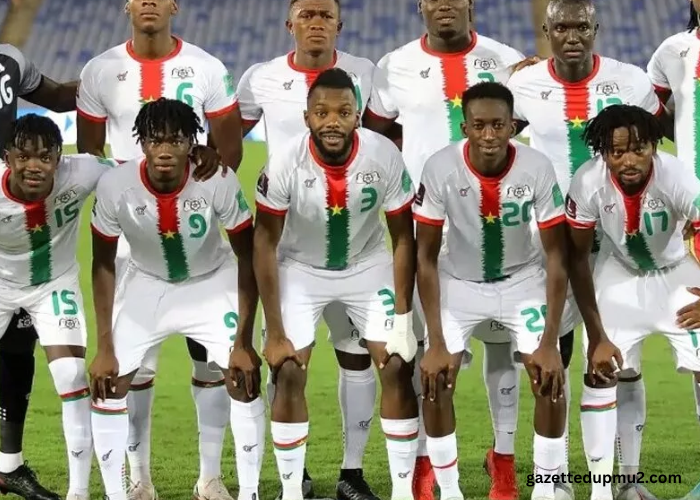The Burkina Faso national football team, known for its passionate supporters and competitive spirit, represents the nation on the international football stage. From its early beginnings to its recent performances, this team has made significant strides and earned a respected place in African football. This article provides an in-depth look at the Burkina Faso national football team, highlighting its history, key achievements, current squad, and future prospects.
A Historical Overview
The Burkina Faso national football team, often referred to as “Les Etalons,” has a rich history that reflects the country’s evolving football landscape. Founded in 1960, shortly after Burkina Faso gained independence, the team initially struggled to make a significant impact on the continental and global stage. However, the dedication of players, coaches, and the support of football fans has propelled the team to prominence over the decades.
Early Years and Development
In the early years, Burkina Faso’s football team faced challenges typical of emerging football nations, including limited resources and infrastructure. Despite these obstacles, the team showed promise and began participating in regional competitions. The 1970s and 1980s were formative years, during which Burkina Faso worked to build a competitive squad and gain experience in international matches.
Rise to Prominence
The 1990s marked a turning point for Burkina Faso football. The team’s performances improved, leading to notable achievements in regional tournaments. One of the significant milestones was qualifying for the Africa Cup of Nations (AFCON) in 1996. This achievement signaled Burkina Faso’s growing presence in African football and laid the foundation for future successes.
Key Achievements
Burkina Faso’s national football team has made considerable progress over the years, with several key achievements highlighting their ascent in the football world. These accomplishments underscore the team’s resilience and dedication.
Africa Cup of Nations Success
One of the most significant achievements in the history of Burkina Faso football is its performance in the Africa Cup of Nations. The team’s best performance came in 2013 when they reached the final. Although they finished as runners-up, losing to Nigeria, this accomplishment was a testament to the team’s growth and competitiveness on the continental stage.
In addition to the 2013 final, Burkina Faso has consistently performed well in AFCON tournaments. The team’s ability to reach the latter stages of the competition reflects its status as one of the prominent footballing nations in Africa.
World Cup Qualifiers
While Burkina Faso has yet to qualify for a FIFA World Cup, the team has made commendable efforts in the qualification rounds. The squad has shown competitive spirit and determination in its bid to secure a place in the global tournament. These efforts are indicative of the team’s ambition to reach new heights in international football.
The Current Squad
The strength of any national football team lies in its squad, and Burkina Faso is no exception. The current squad comprises a mix of experienced players and emerging talents, each contributing to the team’s success. The players’ performances in domestic and international leagues play a crucial role in shaping the team’s fortunes.
Key Players
Several key players have been instrumental in Burkina Faso’s recent successes. These players bring a wealth of experience and skill to the squad, enhancing the team’s competitive edge. Notable names include:
- Bertrand Traoré: Known for his attacking prowess, Traoré has been a key player for Burkina Faso and has played in top European leagues.
- Olivier Kaboré: A talented midfielder, Kaboré has been crucial in controlling the game and providing stability in the middle of the park.
- Hermann Maiga: As a dynamic forward, Maiga’s goal-scoring ability has been a significant asset to the team.
These players, among others, form the backbone of Burkina Faso’s national team and are pivotal to its success on the international stage.
Emerging Talents
In addition to experienced players, Burkina Faso’s football development programs have produced emerging talents who promise to make a significant impact in the future. These young players bring energy and innovation to the team, and their growth will be crucial for the team’s long-term success.
Development and Youth Programs
The development of football in Burkina Faso is supported by various youth programs and academies. These initiatives aim to nurture young talent and provide them with the skills and opportunities needed to excel in the sport.
Grassroots Initiatives
Grassroots football initiatives play a crucial role in identifying and developing young players. Local clubs and academies provide training and competition opportunities for aspiring footballers. These programs focus on building fundamental skills, promoting teamwork, and instilling a love for the game.
National Training Camps
Burkina Faso’s national football federation organizes training camps and development programs for young players. These camps offer advanced training and exposure to high-level competition. They are essential for preparing young talents for the national team and helping them transition into professional football.
Challenges and Future Prospects
While Burkina Faso’s national football team has achieved notable successes, it continues to face challenges that impact its performance and growth. Addressing these challenges will be crucial for the team’s future prospects.
Infrastructure and Resources
One of the challenges faced by Burkina Faso football is the need for improved infrastructure and resources. Investments in stadiums, training facilities, and equipment are essential for the team’s development. Enhancing these aspects will contribute to better training conditions and overall performance.
Competitive Edge
Maintaining a competitive edge in African football requires continuous improvement and adaptation. Burkina Faso’s national team must stay updated with the latest football trends, tactics, and training methods. Collaboration with international coaches and experts can provide valuable insights and enhance the team’s performance.
Youth Development
The success of the national team is closely linked to the development of young players. Continued investment in youth programs and academies will ensure a steady pipeline of talent for the national team. By focusing on nurturing young players and providing them with opportunities, Burkina Faso can build a strong foundation for future success.
Conclusion
The Burkina Faso national football team, with its rich history and significant achievements, represents a dynamic and competitive force in African football. From its early struggles to its recent successes, the team has demonstrated resilience and growth. Key players, emerging talents, and development programs contribute to the team’s strength and potential.
As Burkina Faso continues to advance in international football, addressing challenges and investing in infrastructure, resources, and youth development will be crucial. The passion of the players, support of the fans, and commitment to the sport will drive the team’s future successes. The journey of the Burkina Faso national football team reflects the broader story of football in the country—a story of ambition, dedication, and the pursuit of excellence.





